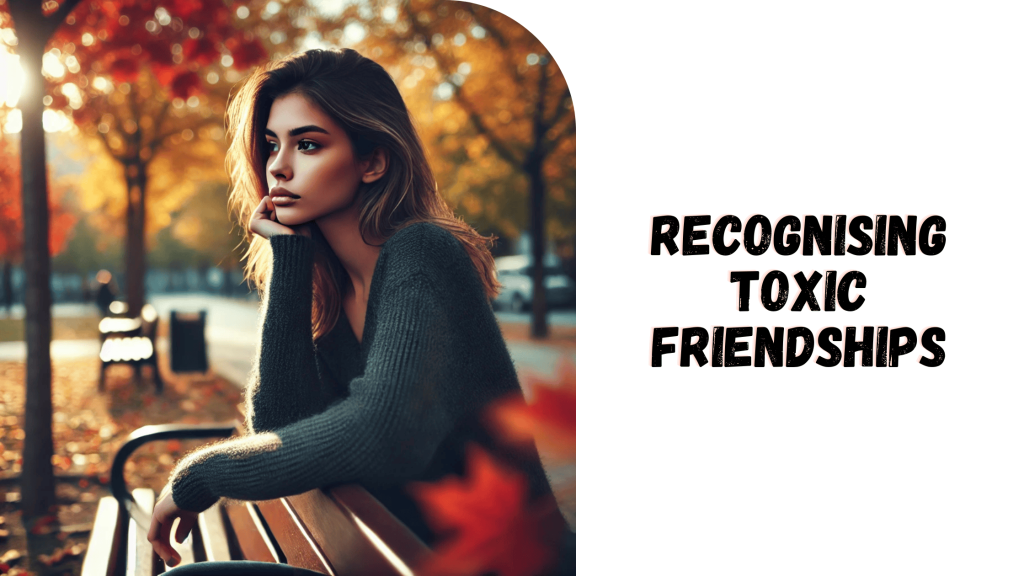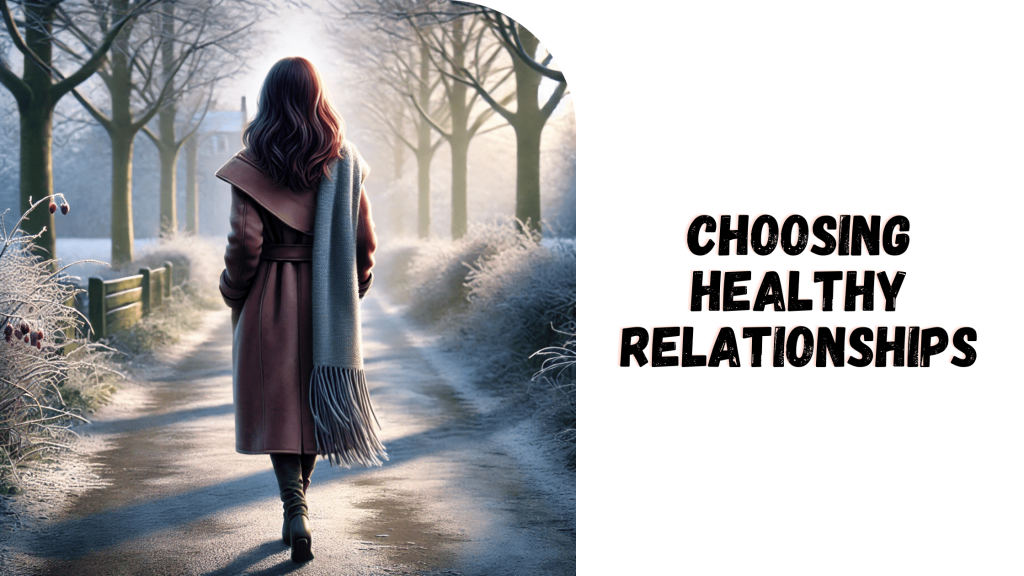
Table of Contents
5 Signs You Have a Toxic Friend in Your Life
An English poet, John Donne wrote, “No man is an island, entire of itself; every man is a piece of the continent, a part of the main”. For human beings to thrive, we need community and positive connections. Healthy and meaningful relationships have a significant impact on how we see and treat ourselves and others. If our inner circle contains toxic people, it can negatively affect our self-esteem, self-confidence and the choices we make in life.
It can make you feel unsafe and affect your mental health and well-being. I am going to give you 5 signs to help you recognise a toxic person in your life. I will also give you advice on what you can do if you have a toxic person in your life.
1. They put less effort into the friendship
With this person, you find that you are putting all the effort and energy into the relationship. You are always messaging them. You are always calling and making plans to catch up. You are the one who is always available to help them with whatever they need. However, when you need something, they are never there. They never message or call you first. They want you to share and tell them everything, but they do not do the same. This can leave you feeling drained, used and unsafe.
2. They Constantly Criticise You & Bring You Down
This person also makes subtle negative comments targeted towards you. For example, you are feeling great about yourself with your new hair colour, and they mention how it’s all over instagram that colour is so aging and no one has that hair colour anymore. The criticism is indirect so if you call them out on it, they can just say “I didn’t mean it like that” or “I was just joking” or my personal favourite “you are too sensitive”.
However, you know deep down it was meant to bring you down. This can leave you feeling that you are not good enough and cause you so much anxiety that you constantly worry about your appearance and what people are saying about you.
3. Disrespecting your boundaries
You have repeatedly told them your needs and boundaries and they constantly ignore them. For example, you mention that Monday mornings is the only time you have to yourself every week, and you love to take a break from your ever growing to do list, snuggle up on the sofa and watch some TV or read a book.
However, they keep turning up to your house at this particular time each week despite you telling them that you really need this alone time. This can leave you feeling powerless and disrespected.
4. Telling you negative things people are saying about you or gossiping behind your back
This person often lets you know the bad things people think or say about you. It’s important to say that this may not necessarily be the truth. They can be trying to manipulate you into behaving the way they want you to behave.
They mention how everyone was laughing the other day at how you always put fruit in your children’s lunchbox, but they never eat it. This also happened to occur at a coffee shop catch up you were not invited to. A toxic person can also share your secrets and spread rumours about you to manipulate how other people see you. This can leave you feeling anxious, betrayed and miserable.
5. They try to isolate you and don’t want you making new friends
Every time you try and make new friends; they have a long list of what is wrong with them and how they are better than your new friends. They try and sabotage plans you make with other people and make you feel like a bad friend for hanging out with someone else. A toxic person wants all your attention and wants you to focus on them. If you continue to spend time with other people, they start hanging out with your new friends as well so you can’t have any time without them being around.
However, they can have as many friends as they want and will often not invite you or not allow you to join their other friendship groups. This can make you feel frustrated, lonely and guilty.
What Now? Setting Boundaries & Moving Forward
By this point, you may know exactly who that toxic person in your life is, but what can you do about it? You can try to have an open and honest conversation, if you feel safe and able to do so. This will only be successful if they are willing to really listen to what you have to say and be able to take responsibility for their actions. If you do not want to or you are not able to have a conversation with the toxic person or the conversation is unsuccessful in improving the situation, then you can end the friendship or create a strategy to minimise their negative impact on your life.
It is also important to say that you do not owe an explanation or have to have a conversation with the toxic person in your life. It is completely fine to slowly withdraw and silently end the friendship.
Ending a friendship is not an easy thing to do. Not just because of the emotional aspect of it but because the toxic person is often part of a wider friendship group or an integral part of your inner circle. This can make things very complicated not just for yourself but for people around you. Toxic people often ensure others believe their narrative of who you are and what “really” happened.
Therefore, it is important to be prepared for other friends’ reactions and that you may lose other people in your life as well. This is outside of your control but see it as an opportunity to find out who your real friends are. The phrase quality not quantity is important regarding the important relationships in your life.
If ending the friendship is not a realistic option, then you need to have a think about what you want the relationship to look like going forward. You need to think about the boundaries needed to protect your own wellbeing. It is not enough to create boundaries; you need to enforce them. Below are a few examples:
- If they are criticising you, you need to challenge that in a respectful but firm way.
- If they do not put in as much effort into the friendship, then you need to put in less effort.
- If they turn up at your house at the one time you have told not to then close the blinds and don’t open the door during this time. You can even book yourself a massage or do another self-care activity so you are out the house at that specific time. This is a great option if you feel you must open the door if they ring the doorbell.
- If they share your secrets with others, then don’t tell them anything.
Toxic relationships have a profound negative effect on our overall wellbeing. Therefore, it is important to recognise who these people are in your life. It is also important to nurture other friendships and relationships that are positive and support you. Toxic people often have reasons or past trauma that can explain why they behave the way they do. Due to your compassion and empathy this can lead you to making excuses for their behaviour. However, by doing this you are diminishing your own worth, your own feelings and self-esteem. If you would like support and guidance while navigating a toxic friendship then book a discovery call and we can discuss this further.
References
- Mind UK – How to improve your Mental Wellbeing
- Mental Health Foundation – Friendship and Mental Wellbeing
THANK YOU
Thank you for taking the time to read our article. Recognising the importance of your health is a powerful first step, and we’re here to support you with reliable information.
Explore our collection of blog posts for more insights on health, wellness, and other topics that inspire and inform. We aim to create content that keeps you engaged and motivated on your journey.
Disclaimer: Our blogs are for informational purposes only and do not replace professional medical advice. Please consult your doctor for personalised guidance.























































0 Comments